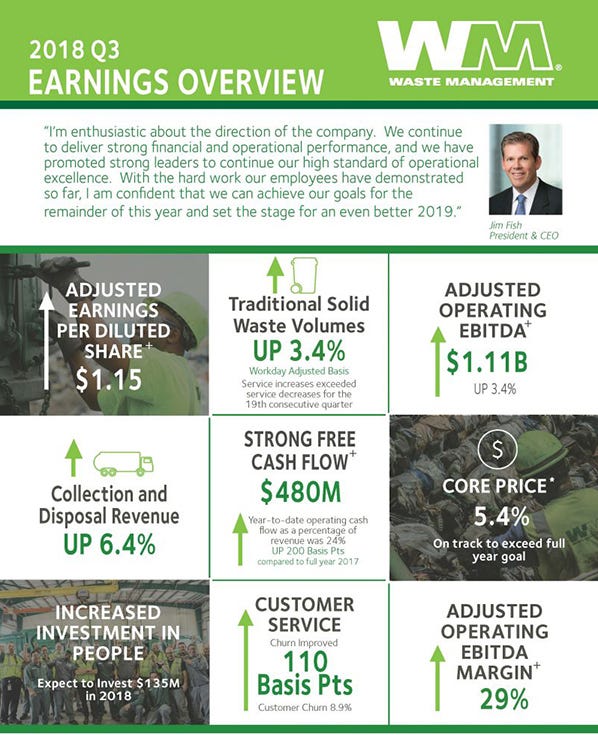Waste Management Sees Strong Growth for Q3 2018
Company reports strong organic revenue growth and strong solid waste performance amid a weak recycling market.
Houston-based Waste Management, Inc. announced financial results for the third quarter of 2018. Despite ongoing recycling headwinds, the company reiterated a recurring theme of a “historically strong solid waste performance” with expected growth heading into Q4 and 2019.
Revenues were $3.82 billion, compared with $3.72 billion for the same period in 2017. Net income for the quarter was $499 million, or $1.16 per diluted share, compared with $386 million, or $0.87 per diluted share, for Q3 2017. On an as-adjusted basis, excluding certain items, net income was $496 million, or $1.15 per diluted share, in Q3 2018, compared with $398 million, or $0.90 per diluted share, in Q3 2017.
“The recurring theme for the first two quarters of 2018 was one of historically strong solid waste performance more than overcoming a weak recycling market,” said Jim Fish, president and CEO of Waste Management, in a statement. “In the third quarter, we generated strong operating EBITDA growth, and we expect that growth to accelerate in the fourth quarter and into 2019. Our collection and disposal business generated strong organic revenue growth of 6.4 percent as a result of our strengthening core price and volume. Additionally, we demonstrated disciplined cost control, particularly on the SG&A line. We executed very well on our plans to refine our recycling pricing model, and we saw tangible benefits from the investments we are making in our employees.”
During a call with investors, Fish explained the company used tax reform proceeds to invest $135 million in employees through bonuses and training. In turn, employee turnover in Q3 2018 improved.
In addition, Fish announced that James E. Trevathan, executive vice president and chief operating officer, will retire at the end of the year after 39 years with the company. John Morris, Waste Management’s current senior vice president of field operations, will succeed Trevathan as chief operating officer. Fish also announced that Jeff M. Harris, senior vice president of field operations, is retiring at the end of the year after 25 years.
“We feel good about our organic growth, despite the challenges we’re overcoming in recycling and the investments we are making in people,” said Fish during the call with investors. “We are optimistic going into 2019. I am very enthusiastic about the direction of the company and have promoted strong leaders. I’m confident we can achieve our goals for the remainder of this year.”

Here are some other highlights from the company’s Q3 earnings:
Revenue growth was driven by strong yield and volume growth in the company’s collection and disposal business, which contributed $200 million of incremental revenue. This was partially offset by a decline in revenue from the company’s recycling line of business, which fell by $52 million year-over-year in Q3 2018.
Core price, which consists of price increases net of rollbacks and fees, excluding the company’s fuel surcharge, was 5.4 percent, compared to 4.7 percent in Q3 2017.
Internal revenue growth from yield for collection and disposal operations was 2.5 percent for Q3 2018 versus 2 percent in Q3 2017.
Traditional solid waste internal revenue growth from volume was 3.2 percent, or 3.4 percent on a workday adjusted basis, this quarter. Total company internal revenue growth from volume, which includes recycling and other ancillary businesses, was 4.2 percent, or 4.4 percent on a workday adjusted basis.
Average recycling commodity prices at the company’s facilities were approximately 47 percent this quarter, compared to the prior year period. Results for the company’s recycling line of business declined by approximately $0.04 per diluted share when compared to Q3 2017. Waste Management said it continues to expect the full-year impact from recycling to be a negative $0.17 to $0.20 per diluted share.
As a percentage of revenue, total company operating expenses were 62.1 percent this quarter, compared to 61.9 percent in Q3 2017. During a call with investors, Trevathan explained the increase in operating expenses is primarily driven by core solid waste volume growth, acquisitions, inflationary cost pressures and investments in the company’s employees.
“After 39 years with our company, I am pleased to end on a quarter with such strong results,” said Trevathan, adding that he will remain a company shareholder. “Waste Management has great assets, and our greatest asset is our people.”
As a percentage of revenue, SG&A expenses were 9 percent in Q3 2018, compared to 9.6 percent in Q3 2017.
Operating EBITDA was $1.08 billion for the third quarter. Adjusted operating EBITDA was $1.11 billion for the third quarter of 2018, an increase of $36 million, or 3.4 percent, from Q3 2017.
Net cash provided by operating activities was $874 million in Q3 2018, compared to $853 million in Q3 2017. Capital expenditures were $404 million, a $54 million increase from the same period last year.
Free cash flow was $480 million in Q3 2018, compared to $509 million in Q3 2017. The decrease in the current quarter free cash flow was driven by increased capital spending as the company invests in its fleet and disposal network to support growth.
Waste Management paid $199 million in dividends to shareholders and spent $200 million to repurchase shares this quarter. It also spent $79 million on acquisitions of traditional solid waste businesses.
During the call, both Fish and Trevathan emphasized that the company expects to meet or exceed analysts’ current 2018 consensus for adjusted operating EBITDA of $4.204 billion and narrows its range from $4.2 billion to $4.22 billion. They also noted Waste Management expects to meet or exceed analysts’ current 2018 consensus of $1.95 billion for free cash flow and narrows its range to $1.95 billion to $2.0 billion.
“I’m enthusiastic about the direction of the company,” said Fish. “We continue to deliver strong financial and operational performance, and we have promoted strong leaders to continue our high standard of operational excellence. With the hard work our employees have demonstrated so far, I am confident that we can achieve our goals for the remainder of this year and set the stage for an even better 2019.”
About the Author(s)
You May Also Like




